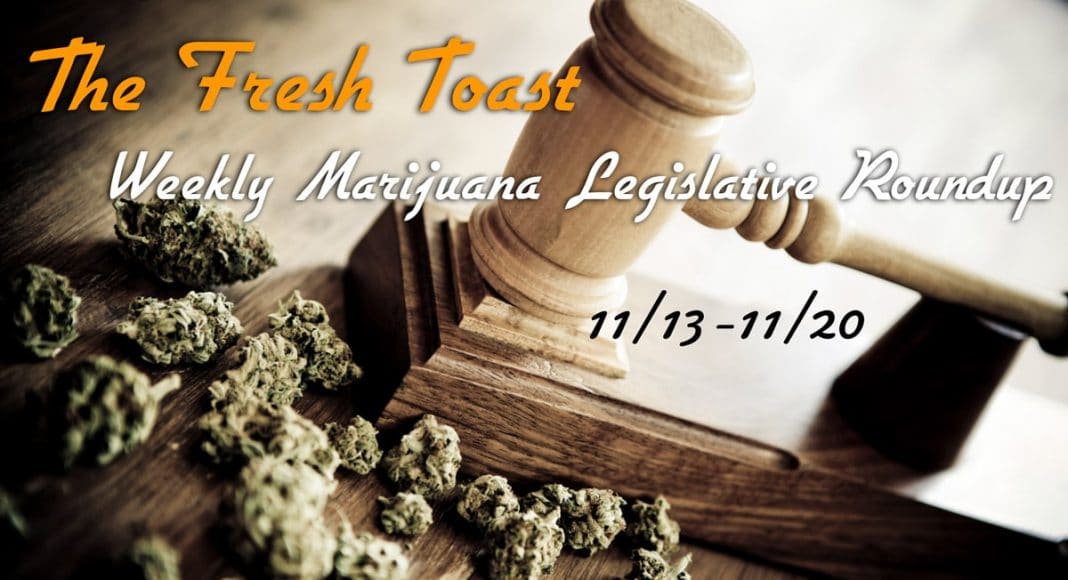Last week was an interesting time for those fighting in legislatures across the nation for cannabis reform. In California, the framework for recreational cannabis was released. Meanwhile, in New Hampshire, legal marijuana was rejected by a legislative committee. Find out about that more in our weekly marijuana legislative roundup.
National:
On Tuesday, Attorney General Jeff Sessions told a congressional committee hearing that federal policy on state marijuana legalization efforts had not changed. When asked about the Department of Justice’s policy toward state marijuana laws, Sessions said, “Our policy is the same really, fundamentally, as the [Obama] policy, which is that the federal law remains in effect and a state can legalize marijuana for its law enforcement purposes, but it still remains illegal with regard to federal purposes.” His comment implicitly affirmed the 2013 Cole Memo, which laid out a number of conditions for states seeking to legalize marijuana without running afoul of federal law enforcement. Sessions has been an outspoken critic of cannabis legalization efforts, which has raised concerns of an impending federal crackdown on state-legal marijuana operations.
California:
On Thursday, three California agencies responsible for implementing recreational marijuana legalization released regulations governing various aspects of the state’s recreational marijuana industry when legalization takes effect on January 1. Under a budget amendment passed in June, regulations on California’s medical cannabis system will mostly be merged with the new recreational regulatory framework. The rules include strict testing and tracking of cannabis from seed to sale, as well as laying out various fees and licensing procedures for cannabis businesses. Under the new rules, the THC content of edibles will be limited to 10 milligrams per serving and 100 milligrams per package. Retailers will be allowed to provide free samples to medical marijuana patients and their caregivers, but not others.
Businesses will be able to apply for special licenses to hold public events where cannabis is consumed. Businesses will be given a six-month grace period on some regulations, allowing them to deal with other businesses without worrying about their medical or recreational licensing status. Marijuana dispensaries will also be able to sell their stock of untested products and products lacking child-proof packaging during this period. The newly-formed Cannabis Advisory Commission will assist the state in implementing the regulatory framework moving forward.
On Tuesday, the San Jose City Council unanimously approved a measure allowing the city’s 16 licensed medical marijuana dispensaries to sell recreational cannabis starting next year. The dispensaries will have to apply for additional licenses, pay additional fees, and undergo more inspections, among other requirements. The bill did not provide for the opening of any new dispensaries in the city.
New Hampshire:
On Tuesday, the House Criminal Justice and Public Safety Committee voted down a bill to legalize recreational marijuana in New Hampshire. House Bill 656 would have legalized cannabis possession and consumption for adults 21 and older, created a licensing system to allow businesses to sell marijuana, and imposed a tax on the sale of cannabis products. Lawmakers cited federal law and public safety concerns in opposing the bill. In July, Gov. Chris Sununu signed legislation decriminalizing possession of small amounts of cannabis, which made New Hampshire the last state in New England to decriminalize marijuana when it took effect in September.
Wyoming:
On Thursday, the Wyoming Joint Judiciary Committee voted in favor of two bills to address loopholes in the state’s marijuana laws. Wyoming law does not explicitly cover edibles infused with THC, which has made prosecution difficult in some cases. The move to strengthen marijuana restrictions comes as many states around the country have sought to decriminalize or legalize the plant for adult use.


